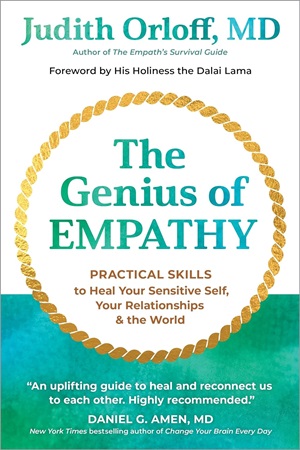
Healing can take many forms,” Dr. Judith Orloff writes in her new book, titled The Genius of Empathy. “…This book focuses on the three main power points of empathy: showing it to yourself, showing it to others, and showing it to the greater world. Empathy is the practice of giving and caring with intention. I’m aware that my well-being and usefulness to others is fueled by being good to you and also by receiving good from you.
ABOUT THE AUTHOR: https://drjudithorloff.com/
That is how empathy flows: both ways.” She also states: “I wrote The Genius of Empathy to support your healing journey. Reading it and using the exercises I suggest will show you ways to approach each day and love yourself through anything, even if you feel lost now. It answers practical questions such as, “How do I have empathy if I’m getting a divorce? If my family treats me unfairly? If I’m overwhelmed or in chronic pain?” The most challenging situation for me is when a loved one is suffering. I’ll share what I’ve learned about coping with this so you can apply it too.”
It’s this kind of unabashed earnestness, crossed with distinctive, medical expertise that makes Dr. Orloff’s book such a refreshing entry in the bastion of nonfiction medical literature. She’s not afraid to stand up for her distinctive beliefs that are crossed with her doctorate, a particularly gutsy admission at the beginning of her book being her capacities as a bonafide empath. In less competent, communicatory hands, this kind of an admission could be something of an audience divide. It could make the read a de-facto divisive kind of work, a sort of left turn even leaving Pulitzer Prize winners like John E. Mack with a more selective base after he went from writing A Prince of Our Disorder on the exploits of T.E. Lawrence to Abduction: Human Encounters with Aliens while still in residency at Harvard University. But like Dr. Mack, Dr. Orloff writes from informed expertise, providing a step-by-step roadmap to embracing an effective mixture of homeopathy with medical influence and intervention. The masthead of which is the titular Empathy she has named in the title of the book, and something not to be underestimated in its powers of healing.
“The Genius of Empathy is for everyone who is interested in self-healing and in communicating more effectively in relationships. This book is for all caring people: quiet-loving introverts and empaths as well as extroverts who thrive on stimulation and ambiverts who are a combination of both. It’s also for those who may be curious about being more empathic but don’t know where to begin.
AMAZON: https://www.amazon.com/Genius-Empathy-Practical-Sensitive-Relationships/dp/1683649710
Perhaps your spouse or coworker piqued your interest, so you want to explore,” she states. “As part of developing empathy, you’ll learn how to avoid absorbing the stress, symptoms, or emotions of others, a skill set that will make you feel safer navigating the world. I offer simple exercises to practice expressing empathy, especially with relationships that are difficult or draining. In addition, I will help you treat yourself with more kindness and stop beating yourself up for perceived shortcomings.”
Cyrus Rhodes



























